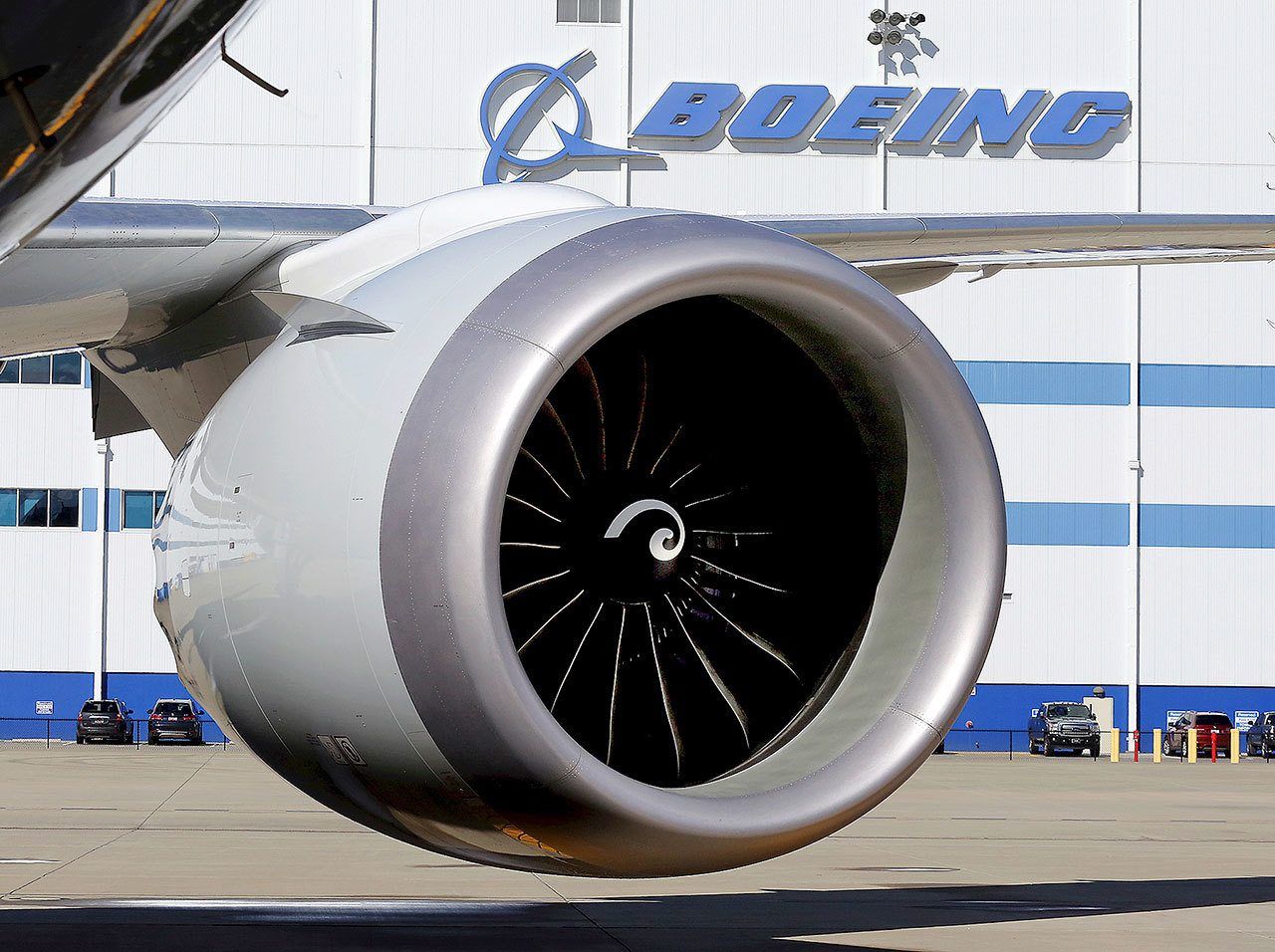EVERETT — Boeing is happy to be at the table for dinner discussions with President Donald Trump, even if such proximity comes with an occasional dressing down on social media.
“We’ve had the privilege of having a very open dialogue with him on business issues,” Boeing CEO and Chairman Dennis Muilenburg said during a conference call with financial analysts and reporters Wednesday. Earlier in the day, the company announced better-than-expected quarterly profits, along with a $243 million loss on its KC-46 tanker program.
Trump kicked off his dialogue with the airplane maker in early December when, as president-elect, he took to Twitter to blast the cost of replacing the Air Force One jets with new heavily modified 747s. He later appeared to try to pit Boeing and Lockheed Martin against each other in an effort to cut the price tag for F-35 fifth-generation fighter. CEOs from the two companies met separately with Trump, and came away publicly backing cost-cutting efforts.
“We’ve got a voice at the table,” Muilenburg said Wednesday.
The American economy and Boeing will benefit from the new administration’s “pro-business agenda,” which includes cutting corporate tax rates, slashing regulations on private companies and beefing up defense budgets, he said.
“We’re very supportive” of President Donald Trump’s economic initiatives, Muilenburg said.
Trump’s administration also includes many key figures skeptical of big corporations and freer trade. He seemed to take a more protectionist turn Monday when he pulled the U.S. out of an Asia-Pacific trade agreement and pledged to renegotiate the North American Free Trade Agreement. On the campaign trail, he savaged both accords as helping hollow out American manufacturing. That claim — that “rusted out factories (are) scattered like tombstones” across the U.S. — doesn’t hold up to economic data from the U.S. Federal Reserve System, but it resonated in Rust Belt towns and communities most affected by competition from abroad.
Investors appear to have high hopes for Boeing’s future, and the share price hit a record high of $168.65 during intra-day trading, before coming down to $167.38 by close of market — nearly $4 above its opening value. U.S. stock markets have gotten a boost in recent months that many market watchers attribute to confidence that Trump will usher in better times for companies’ bottom lines. That optimism helped push the Dow Jones Industrial Average past 20,000 on Wednesday for the first time.
Boeing’s earnings were buoyed by cash from its 787 Dreamliner program, which is becoming more profitable.
Muilenburg repeated his pledge to steer cash to investors by spending billions of dollars buying back shares and raising dividends, despite increasing market challenges in the next few years. They expect that improved Dreamliner profitability, resurgent defense spending, continued cost cutting and higher output of its newest version of the 737 will offset weak wide-body airplane sales and other market pressures.
The aerospace giant’s near-record order backlog insulates its bottom line somewhat from market shocks. However, Boeing executives’ promises to keep up R&D investment, share buybacks and boost dividends could strain the company’s balance sheet.
“They can’t keep spending this way and not continue to dwindle cash balances,” said George Ferguson, an analyst with Bloomberg Intelligence.
Boeing expects its revenue to fall this year to between $90.5 billion to $92.5 billion. Analysts had expected annual sales of $93 billion.
The decline in revenue is driven in large part due to slowing 777 production. Boeing cut output from 8.3 to 7 airplanes this month and expects to lower it to 5 airplanes a month later this year. Next year, that is expected to drop to 3.5 planes a month as production begins on its successor, the 777X.
Despite the 777 rate cuts, total commercial airplane deliveries are expected to rise to between 760 and 765 this year, a slight boost over 2016’s 748 deliveries.
Operating cash flow will be about $10.8 billion, up from the $10.5 billion generated in 2016. Earnings adjusted for pension expenses will probably be $9.10 to $9.30 a share this year, compared with the $9.24 predicted by analysts.
The KC-46 tanker charge is related to installation costs coming from a design problem with the aerial refueling tanker’s wiring that came up two years ago.
No further problems are expected, Muilenburg said.
Company leaders are optimistic about the new Trump administration, he said.
Many business leaders are excited about Trump’s promises to slash regulations and give private companies freer range in the marketplace.
Concerns persist though over what the Trump administration could mean for individual companies. He already has taken Boeing, Lockheed Martin, Carrier and Ford to task via Twitter.
Fear of attracting Trump’s cyber wrath is enough to drive down share prices. On Friday, U.S. aerospace supplier TransDigm’s share price dropped by nearly $30 as investors fretted that its aggressive pricing on defense contracts would draw Trump’s attention. Several investment analysts called the concerns unwarranted. Nonetheless, TransDigm’s shares still were trading close to where they landed Friday morning.
Analysts had mixed reactions Wednesday for Boeing’s outlook. Several say the share price could rise further, while others say it is likely to come down slightly.
Material from Bloomberg was used in this report.
Dan Catchpole: 425-339-3454; dcatchpole@heraldnet.com; Twitter: @dcatchpole.
Talk to us
> Give us your news tips.
> Send us a letter to the editor.
> More Herald contact information.

























